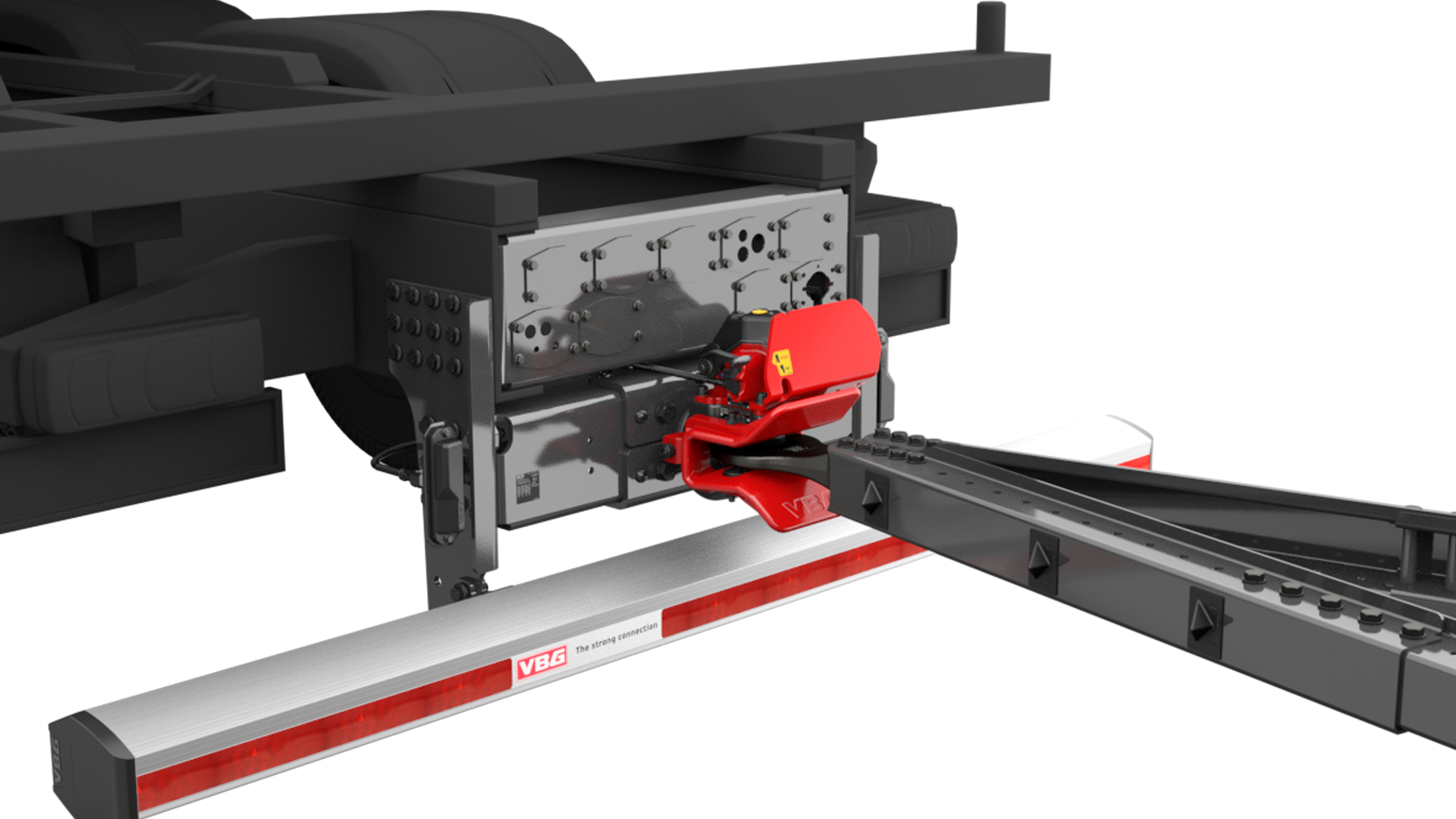How do you wash your truck and trailer?
Winter is long up here in the Nordic countries and so are the salted and slushy roads that leave traces of dirt on all the trucks that are rolling around the country. Keeping your truck and trailer clean gives them a longer service life. It also ensures that your equipment is kept in good condition for the sake of road safety. But how do hauliers and drivers handle the cleaning and maintenance of their trucks after many miles on winter roads?
Washing routines at haulage contractors
Trucks and trailers are costly investments that are destined to be in use for many years, which makes maintenance particularly important. The truck rigs are the haulage company's representatives on the roads and it is important that the vehicles maintain high class and style. To find out how the daily and weekly maintenance of trucks and trailers works in reality, I talked to Lars Lindbloms åkeri AB in Skåne. Lars, daughter Vilma and son Philip run excavating, agricultural products, gravel, stone and asphalt for the family-owned haulage company that bears father Lars' name, Lars Lindbloms åkeri. What do they do to set good and sustainable routines for washing and maintenance?
As the haulage company conducts various types of transport, there are different requirements for cleanliness depending on the type of goods they are carrying. To keep track of the status of the various trucks, they record each one in a cleaning journal. This type of documentation is required by the Swedish Board of Agriculture when, for example, transporting grain that can be classified as animal feed or foodstuff. What the previous load contained and how the truck was cleaned is recorded in the journal.
Weekly maintenance is something that is handled jointly and they help each other as best they can, but the principle is that the person who drove the truck has the ultimate responsibility for it being in order and kept clean, which Lars, as the company owner, thinks is a flexible and good solution. Vilma, who has grown up in the haulage business, regards it as a lifestyle; you drive, you clean and you drive again. When asked what it’s like to be responsible for the truck being neat and in good order, she responds: ” I don't think too much about it, it's obvious that you have to keep your vehicles nice and clean.”
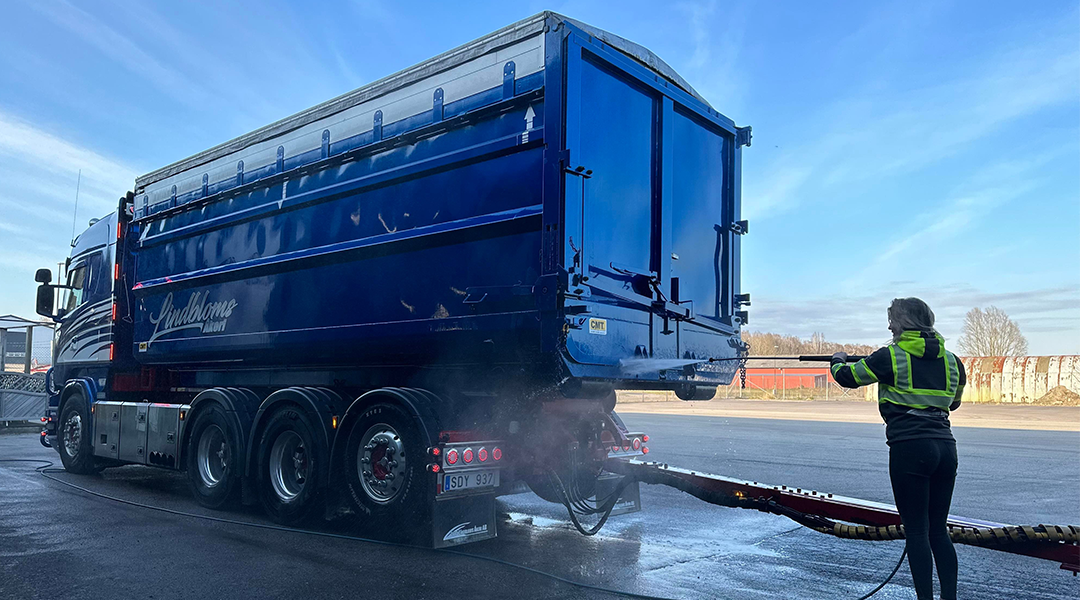
“The weather app decides if it’s washing on Friday or Monday. It's all about whether it's worth washing one day or the next, otherwise it's only twenty kilometres and it's dirty again.”
At the time of writing, the haulage company has three trucks that they need to take care of and have solved the washing by renting a local operator who has a wash-down pad. “We try to wash the trucks about once a week.” In connection with washing is when they have a procedure to ensure that all is well lubricated that should be lubricated and blown clean where needed. Both Lars and Vilma think lubrication is quick and easy, once you’ve got hold of the oil it’s quickly done.
“It’s cheaper to lubricate than to repair.”
They make sure they wash with foam detergent and pressure washer during the winter months to keep everything in good condition. But it’s when spring and school holidays are approaching that the big spring clean and spring wash is done. Lars thinks it’s a good idea to do the student run, a tradition for school graduation - “there’s a clear deadline then of when you want the truck to be in its absolute top condition to cruise around and shine on the streets with happy students on the flatbed. Or you apply to take part in a truck show somewhere so you can put a little extra into the polishing.” Whether the load is students or pellets, Lars points out that it's important what the trucks look like. “A tidy and proper appearance makes for an easy working day and attracts new business and drives. The truck and the driver are the face of the haulage company.”
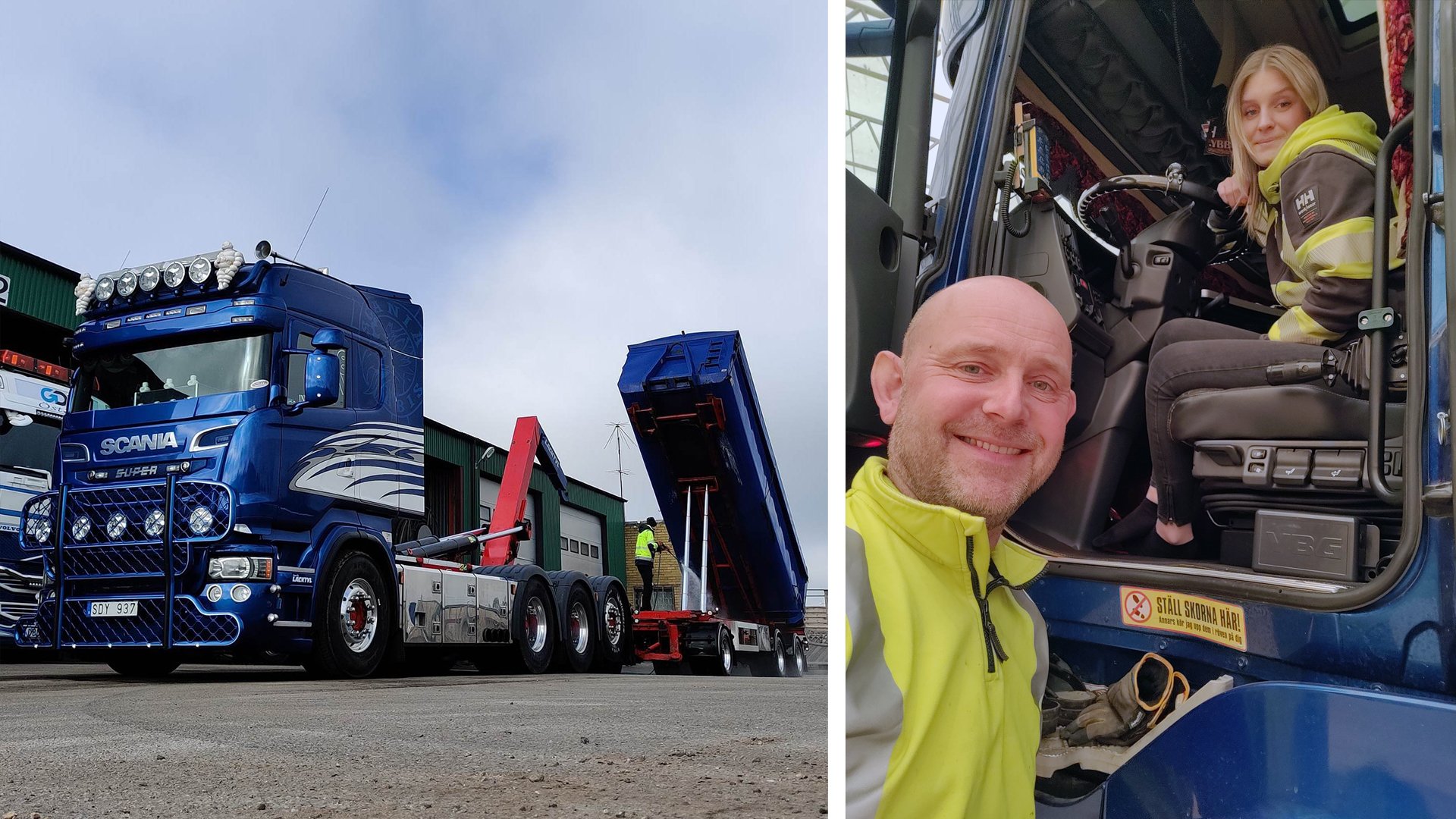
Polish nerd or what?
Keeping a truck in good condition is part of improving the working environment for the driver and you can significantly extend the life of your vehicle rig by keeping it clean and tidy. But what do drivers themselves think about having to wash the vehicle and trailer, keeping it in good condition? We talked to Filip Berg and Tove Helgesson, two drivers with completely different types of driving task, but with the same interest when it comes to keeping their vehicle in tiptop condition.
Filip Berg carries mixed cargo with his own van for Vendelbo Spedition and is out on trips that can last up to 14 days. He doesn’t budge one inch when it comes to cleanliness and proper maintenance of his vehicle as it’s his place of residence on such long shifts. When I ask Filip what his position is on washing and maintenance, he tells me that his feeling is that it differs greatly among different hauliers.
- “For us, a clean and well-maintained vehicle is important and something that the drivers spend the time necessary to keep clean and tidy. Maintaining a high lowest level is really important with regard to road safety, and it looks good too.”
So how long does it take Filip to keep his vehicle in good condition? He thinks long before answering.
- “It can take anything between 1 and maybe up to 5 hours. If I want to be quick, I like to drive the van in an automatic wash and do the finishing work and polishing by hand afterwards, if there’s time, otherwise I do it in my spare time as I think it's fun and important.”
He tries to wash once a week or after every trip.
- “Around this time of year with lots of salt and grit on the roads, it’s extremely important to keep the hitch clean as it can easily start to jam if you’re not careful about cleaning and lubricating it.”
His best trick for maintaining the vehicle interior between washes is to use wipes.
- “Wet wipes are my best cleaning tip, no stains or streaks and it smells fresh in the cab.”
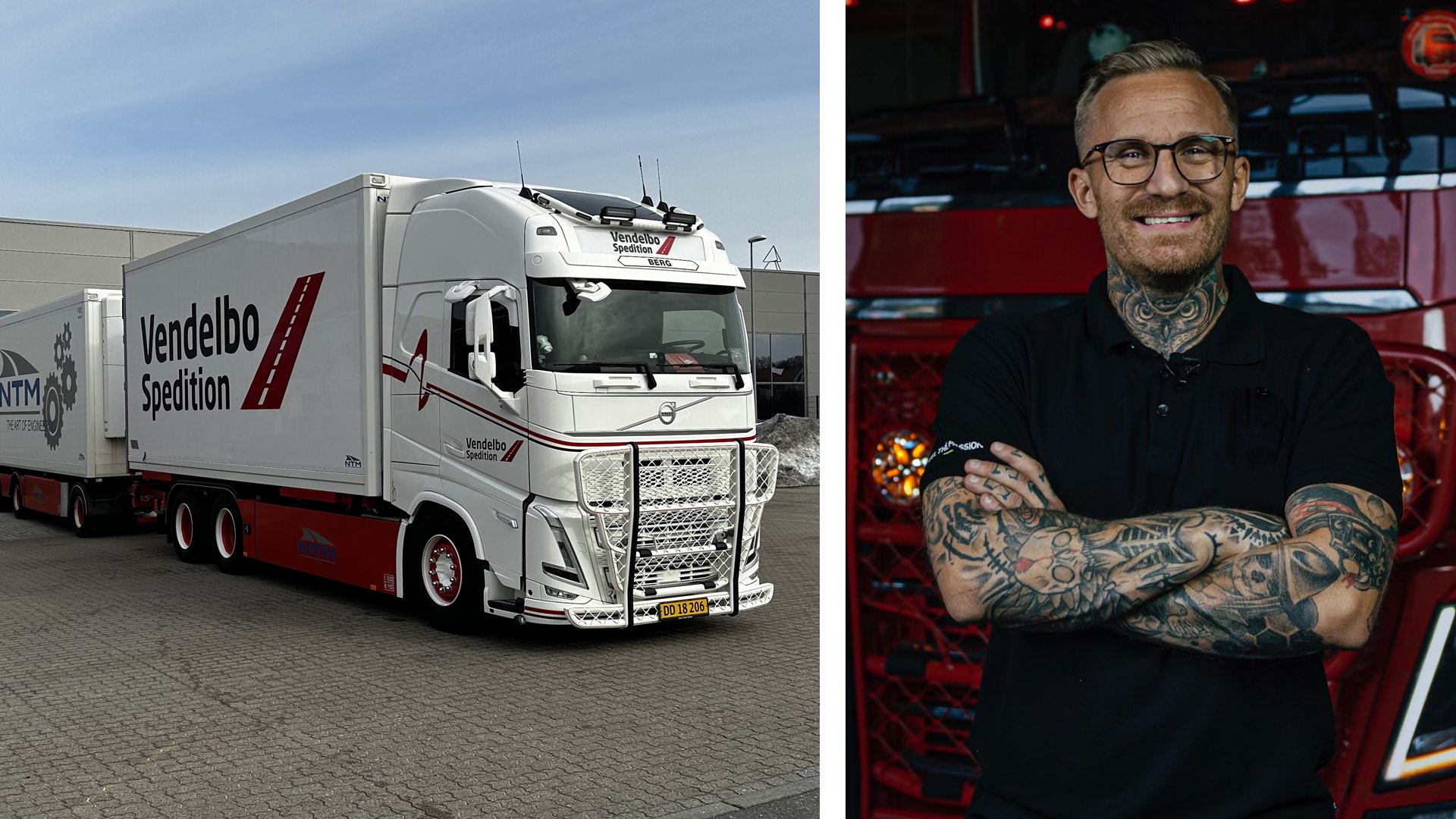
Tove Helgesson drives a timber truck for Gotessons haulage in southern Sweden. She shares the truck with a colleague and they help each other to take care of the maintenance of the vehicle and they do what they have time for in terms of maintenance and service during the week. She is careful to keep her work environment clean, tidy and fresh, so keeping the vehicle in tiptop condition is something that she thinks is essential to enjoying the job. But driving in forests makes it impossible to avoid grunge, mud and dust. Getting the vehicle nice and clean after a week on muddy roads is something that is routine for Tove, who prefers to wash her vehicle by hand in a wash hall on Fridays.
- “Washing by hand means I can spend a little extra time rubbing and polishing a little extra shine, and that can take forever... it’s nice when it shines a little extra and then it's worth putting in some free time to get the desired result.”
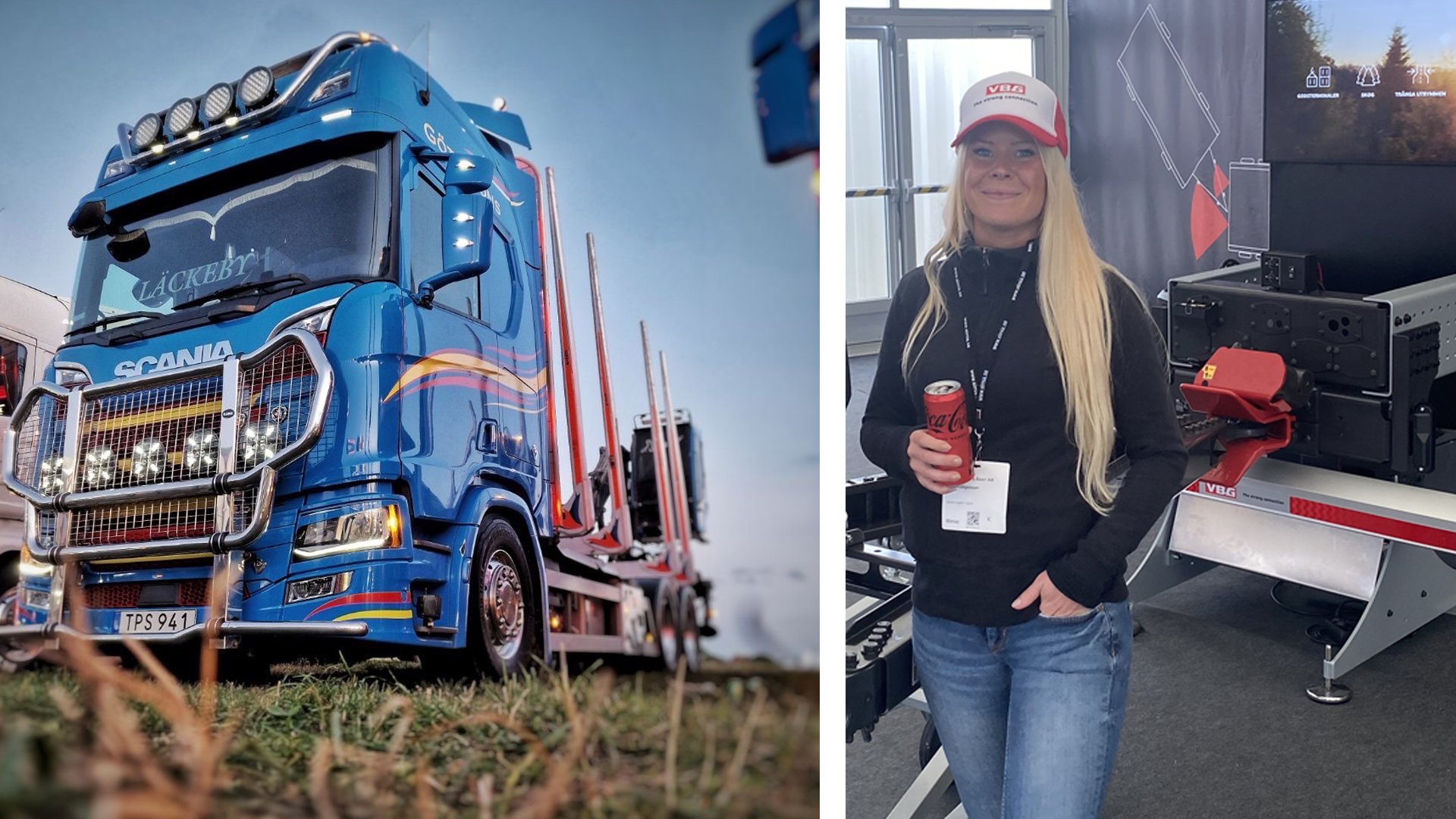
Smart washing throughout the year
During the winter months, up to 300–400 kilos of dirt can get stuck on a truck rig. This means it’s essential with an underbody wash to remove unnecessary weight in the form of soil, grit, snow and ice that sticks underneath the truck and trailer. Also take the chance to inspect the vehicle and trailer for flash rust, particles of iron that are etched onto the paint and start to rust. This is mainly iron particles from tyre studs, snow ploughs and brake discs. This type of rust is deceptive in that it is not always visible, for example, on dark varnishes. You can tell that you have got flash rust on your vehicle if you feel a rough surface even after washing and degreasing. To get rid of the specks, there are special cleaners that you can use a couple of times a year.
Spring and summer, it’s mostly dust and mud that must be removed from the truck and trailer. The only thing you need to keep in mind then is not to wash the truck in direct sunlight as there is a risk of the chemicals drying faster than you can rinse them off, which can damage the paintwork.
Wash hall, wash-down pad or automatic wash?
There are different perspectives and laws with regard to washing your vehicle. No matter how and where you choose to wash, we should together help to ensure that no dirty water enters into our drains. Wastewater from vehicle washes contains various metals, oils and other organic and inorganic substances that are harmful to plants and animals.
Automatic washes can be convenient and effective for certain types of transports. Wash halls offer the possibility of manually inspecting the rig while using a pressure washer. There’s also no need to stand outdoors freezing but can polish up your rig in peace and quiet for as long as you like. Wash-down pads are an alternative for those who need to wash a small number of vehicles.
9 tips for washing your truck and trailer
Here are some tips for how to wash your way to a sparkling clean and road-safe truck rig.
- Like dissolves like
Use the right chemicals and as little water as possible. - Wash a small area at a time
Cover trucks and trailers in small areas, rinse, and then rinse again to avoid long exposure times and chemicals drying. - With the environment in mind
Don't stand outside in the yard or driveway and wash! Dirt consisting of oil and heavy metals needs to be disposed of in an environmentally safe manner. - Pressure wash the right way
Use a pressure washer to primarily rinse off loose dirt and road dust. Dirt that cannot be removed in this way you can try to remove with a soft brush or sponge with detergents that are best suited for the type of dirt in question.
NOTE! Pressure washers should be used with care when cleaning moving parts where water and dirt can be pressed in.
- Have a high lowest level
Have a washing routine with a high lowest level, even minor maintenance saves time and money in the long run. - Seek shade when the sun is shining
Never wash the vehicle in direct sunlight to avoid chemicals etching themselves to the paintwork and damaging it. - Spray systematically
Clean the truck and trailer from the bottom up to avoid dirt running down over the car and making streaks that can be difficult to remove. - Wax more in winter
That the truck’s paintwork is protected and the rig is kept clean for longer after waxing is well known. It’s extra important during the winter not to skimp on waxing as a newly waxed surface is a good protection against road salt and stands up to grungy winter dirt. - Dry and lubricate
Once washing is done, it's time to dry and lubricate. If you’ve happened to wash away any lubricant, make sure you re-lubricate the components. A clean and well-oiled coupling is a safety measure for both driver and other road users, so make sure to keep your coupling mechanism as clean and in good condition as the rest of the truck.
VBG MechMatic is a convenient solution to ensure that your coupling mechanism always has the right amount of oil and is kept clean.
Recommended reading
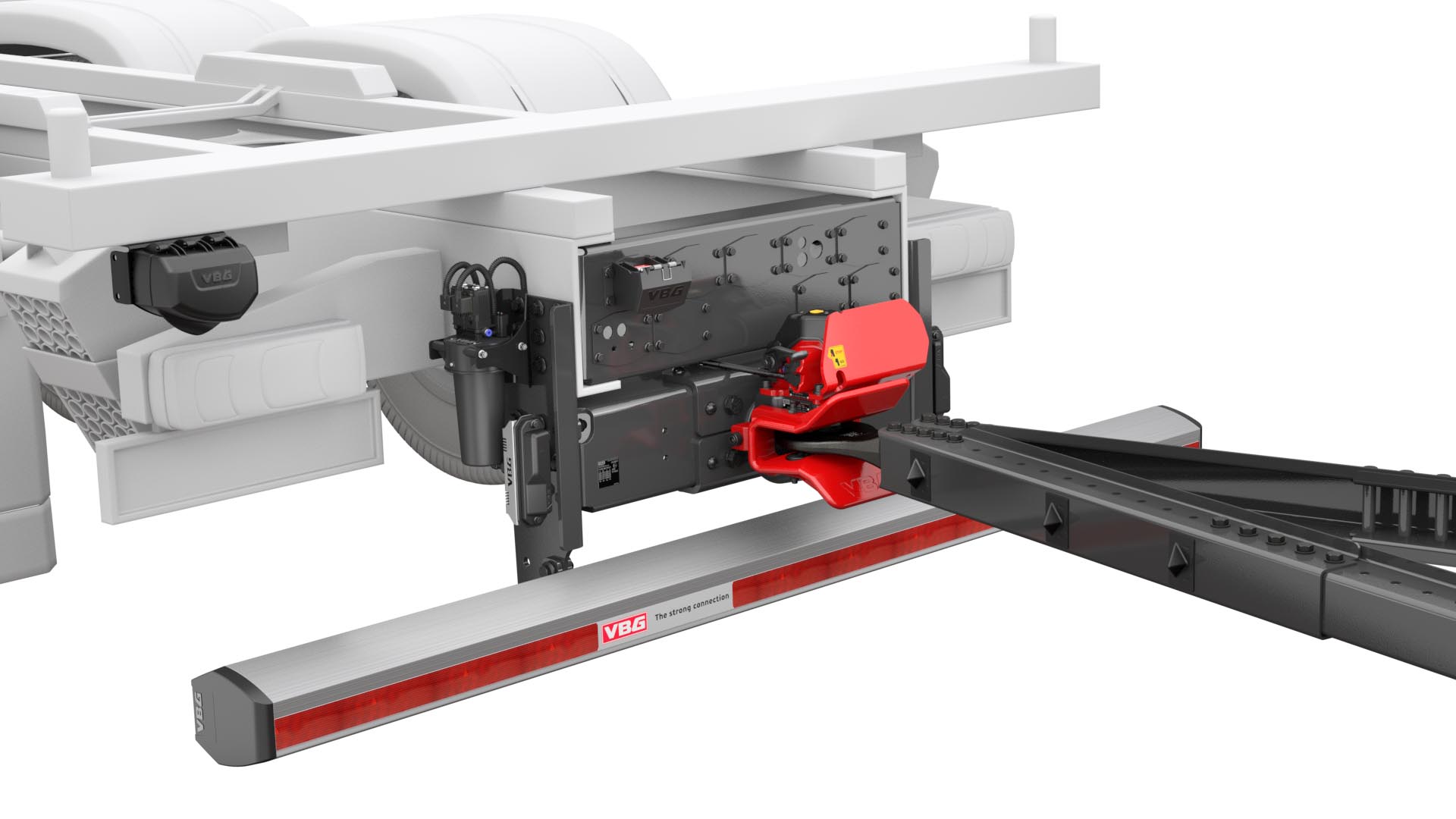
How Do You Build the Optimal VBG System?
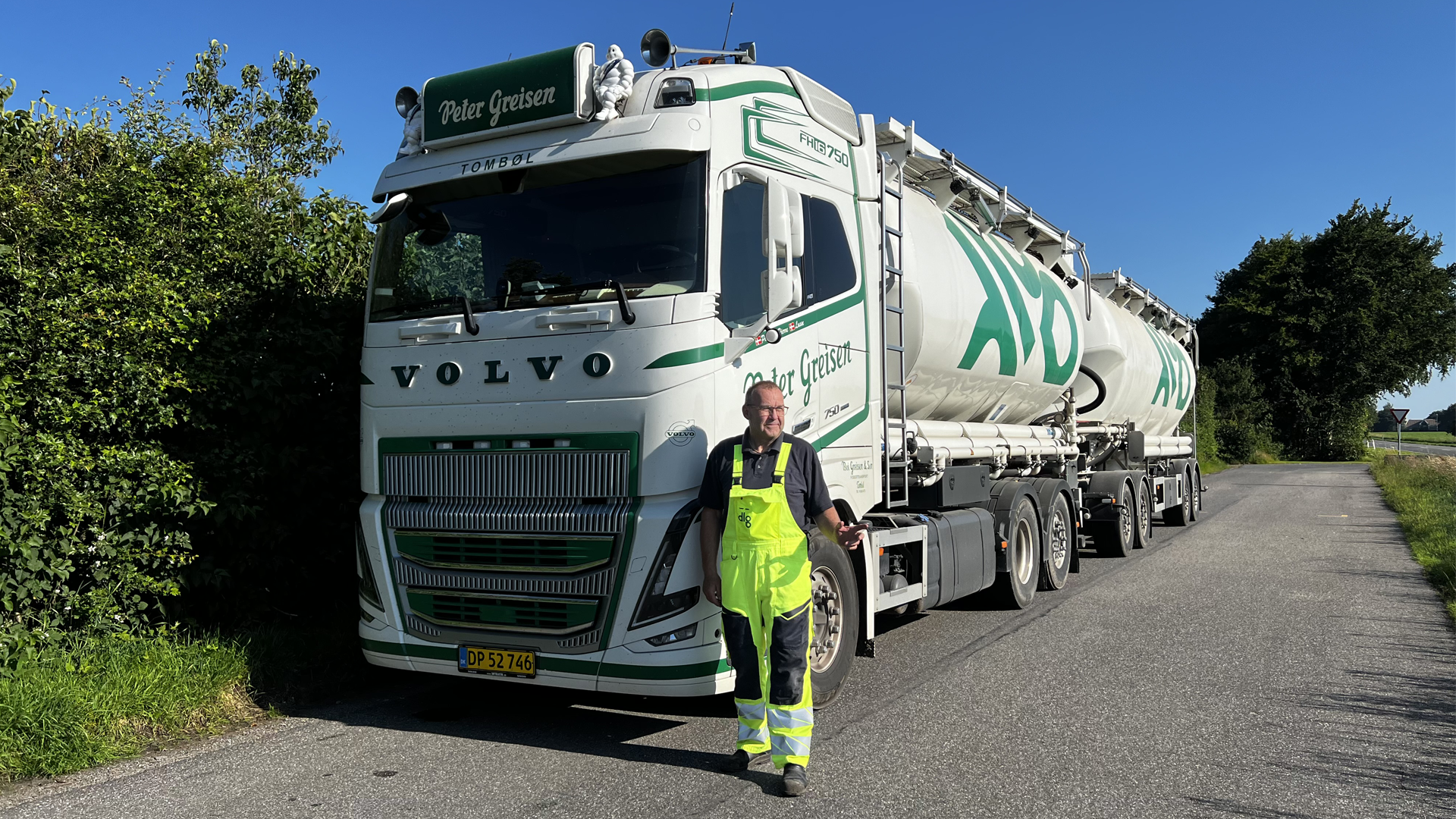
How can new technology streamline and improve the workday for hauliers?
